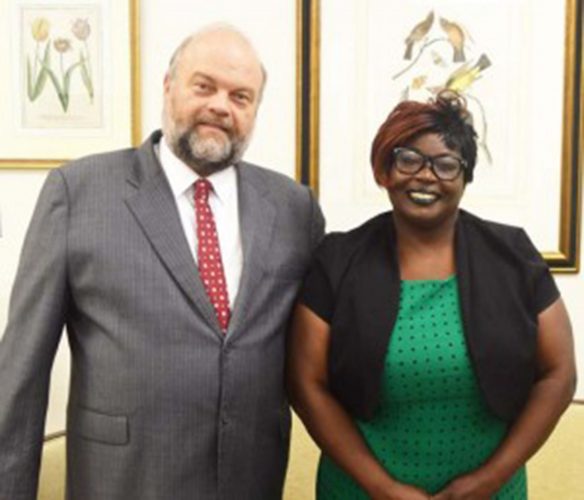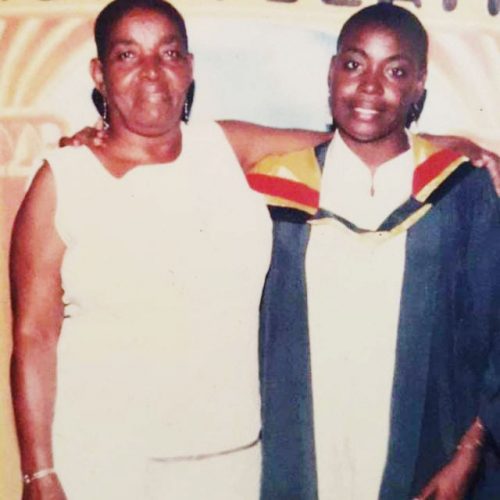For years, the name Shaundell Shipley could be described as being synonymous with community building and child advocacy as regardless of the environment she would not hesitate to intervene once a child was at risk.
While today she is not working directly in the capacity of effecting change in children’s lives, she does not need an official title to make a difference. As a matter of fact, she uses every day as an opportunity to impact the lives of children and their families.
Shipley’s love for children may have come from her mother, who despite having six of her own still mothered other children and so their Vryheid’s Lust, East Coast Demerara home always had other children. The trajectory of her career changed many years later, but at around the age of ten, Shipley said, she knew she was never going to be a biological mother.

Today Shipley is mother to two adopted children, a choice which had nothing to do with her own fertility. She is extremely proud of her children, and if given the opportunity could spend hours regaling anyone with their exploits.
Shipley had a degree in tourism and worked in the hotel industry before she applied for a position at what was then known as the USAID/Guyana HIV/AIDS Reduction and Prevention Project (GHARP). Before that, she volunteered at Lifeline Counselling Services and became part of the Lions movement, which saw her enter the world of children’s advocacy and community building, which she never left.
Now a trained social worker, in 2016 Shipley was selected for the United States’ International Visitor Leadership Program under “Children in the U.S. Justice System”. She also worked with Forward Guyana, an organisation that was instrumental in the setting up of the first Child Advocacy Centre (CAC) in Guyana. CACs provide services to children who have been physically and sexually abused and are referred to as one-stop centres for the abused children where they access all of the needed services in one place. Today there are seven such centres across Guyana, with the last one being opened last September in Port Kaituma.

For some years, she was also attached to Blossom Inc, where she was involved in the forensic interviewing of child sexual abuse victims and also provided court support for many of them.
Today Shipley is attached to the National AIDS Programme Secretariat as its Key Populations Programme Coordinator, but she said anytime she sees children who are in need of help she never hesitates to do so.
And if she sees children in positions they should not be in, she confronts the people responsible, even if it is seeing a mother with a child begging on the streets,
“As a child, I loved helping people. I loved children… and I think I got that love from my mom because we grew up in a home even though it was difficult. My mom always had other children, she always cared for others and there were always other children in the home…” Shipley told Stabroek Weekend in an interview.
‘Had our struggles’
Going back to her childhood days, Shipley, who is the youngest of six children, said her father was always busy working and later he left to study overseas. At the age of 13, she recalled, he was out of the picture but her mother was always constant in their lives.
“But we had our real struggles and my brother, being the eldest, he started working at 17, and he was a huge support to us… My brother played a very important role for us, for me and my other four siblings… He was like our father figure. He supported us and ensured we had money to go to school…,” she said.
After high school, Shipley said, her first job was as a clerk at the University of Guyana, which provided her foundation in terms of organizational skills. Working there, she gained experience in operating myriad office equipment, which proved invaluable.
It was right after this that she enrolled to do a degree in tourism, during which she was granted an internship in the tourism industry in Curacao, where she assisted in developing materials in English. After graduation, she worked at two hotels before transitioning to a new career path.
It was applying for a position to become a social marketer at GHARP that guided this move and later led to her pursuing a degree in social work. In the second phase of the programme, she was involved in tracking the work of civil society organisations (CSOs) that fell under the project.
“I felt when I was working in the service industry I could have offered more. I mean, you provided for your customers and even the staff, I referred to them as customers, so you had external and internal customers…but I felt I could have offered more,” she said, reflecting on her days working in the hotel industry.
Her work with GHARP involved fighting HIV/AIDS, and Shipley said she felt that she could really make an impact on people’s lives and started volunteering with Lifeline Counselling. Through this organisation’s buddy system, she was assigned to children to whom she provided support. She even fostered a child for some months during that period.
After the project came to an end, Shipley said, she did some consultancies until she saw there was need for a social worker at what was then Forward Guyana. She was tasked with assisting in setting up the first CACs and she also did a lot of the forensic interviews.
She left Forward Guyana and went to Blossom Inc where she continued to do forensic interviews. At one point, she said, people may have thought she worked with the Child Care and Protection Agency (CCPA).
“My time between Blossom Inc and the CCPA was very seamless,” she continued, sharing that for a period she visited the Mahaica Children’s Home every Saturday and worked with the children, something she found great pleasure in.
“The fondness I felt for the children in Mahaica Home was so much that I wanted to leave Blossom Inc and go work there because I felt I could have really made a difference in those children’s lives. Children need people to love and care for them and I honestly felt I could have done it and I still believe — even though I don’t go now — I still believe I can help…,” she said. Blossom Inc, along the CCPA, was also involved in helping children to be reintegrated with their families.
Today the CCPA has a department that is tasked with reintegrating children with their families or placing them in homes as the institutionalization of children is the last option.
Shipley recalled that whenever she conducted a forensic interview she always thought of the perpetrator being convicted as she knew how important it was for the child to get some closure. So many of the cases stuck with her and she recalled that people would ask how she conducted the interviews and she responded that she treated them as cases as opposed to individuals. But yet there were times when some children’s cases just broke her heart.
Centre of her world
Shipley said she shared with her children that when she was doing this interview, she would freely state that they were adopted. She said letting her children know they were adopted at a very early age was very important to her, even though they have no communication with their biological relatives.
Her son has been hers since he was days shy of a month old and is now 15. Her daughter was seven months old and is now nine years old. They are of different races: her son is of African descent and her daughter of Indigenous descent and Shipley refers to them as the centres of her world.
She recalled that she was on six weeks maternity leave to be with her son and had approached the National Insurance Scheme, but was told she could not receive maternity leave benefits.
She said that period gave her some time to bond with her son and also to become mentally prepared to mother a child.
Shipley said she knew very early that she would not have biological children and over the years it mattered not what others said, she never changed her mind.
“The only regret I have when it comes to adopting is that I should have done it earlier. When I met my son I was close to 35…,” she said.
Almost six years later, she met her daughter’s biological mother while doing some work in the interior. She recalled having communication with the woman, who was going through some difficulties and about three weeks after that encounter, the mother took the child to the local hospital and asked that she be given to Shipley.
Shipley said she ensured that the matter went through the CCPA after which “everything fell into line”.
Her children, she said, are “totally different” as while her son is more nonchalant, her daughter is the “kindest, most loving person ever”.
As with any parent, Shipley’s children come first and it was her son’s comment that she was not assisting him with his preparation for the National Grade Six Assessment that made her leave Blossom Inc. She said that while she did work with him, she spent a lot of time “typing statements” from the forensic interviews she had conducted.
“That was when I felt I needed a new job because here again my children were suffering and I think it was unfair for me to be helping others and my children are suffering…,” she said. It was at this point that she moved to NAPS, where she worked with vulnerable groups.
Outside of school, she ensures that her children are involved in extracurricular activities and she is always there cheering them on. Shipley also has three dogs, two lovebirds and a parrot.
Shipley also has her own organisation, Sunshine Foundation, which focusses on women and girls as she believes that if she empowers women then she empowers families. That organisation has no physical office, but she, along with three others, helps women and children with assistance from friends.
“So every day if there [children have] any need, if there is anything they lack and anyone contacts me through Sunshine Foundation I assist,” she said, adding that they decide which communities to work in following needs assessments.
“Every day I do something that would impact someone’s life, every religious day,” Shipley said.

